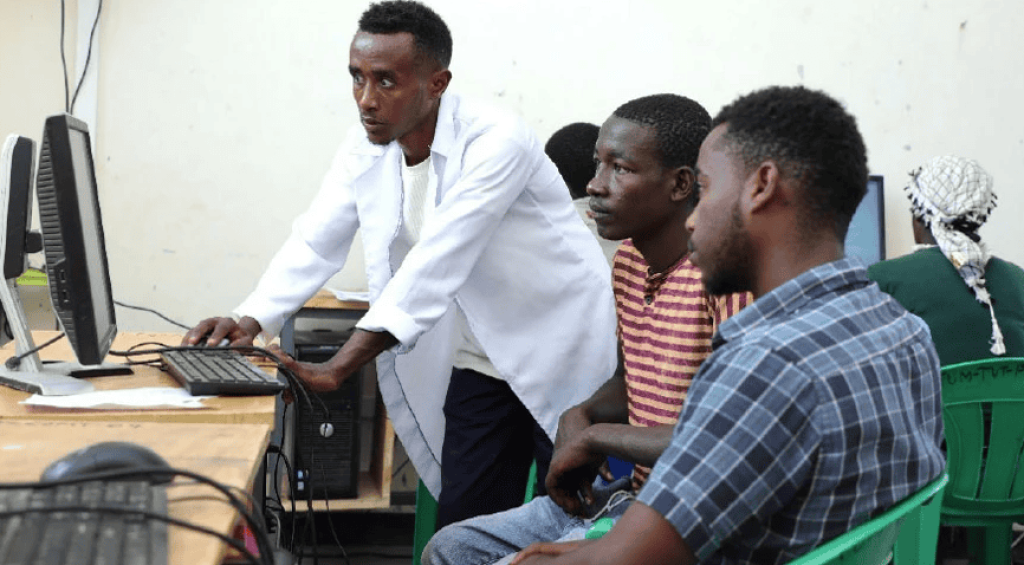In 2000, the World Bank published, “Can Africa Claim the 21st Century?” This landmark report proposed four crucial areas of progress, and the priorities that were highlighted are even more pertinent today: improve governance and reduce conflict, invest in people; increase competitiveness and diversify economies; and reduce aid dependence and debt.
Much of what was on the agenda in 2000 remains unfinished business. Over the past quarter century, Africa has not managed to catch up with the rest of the world. Despite advances in specific sectors and countries, it remains the only region in which most countries are low- and lower-middle-income, and where most of the world’s extreme poor now live. The number of internally displaced persons due to conflict is at an all-time high (21.8 million in 2020) along with new displacement from disasters. Conflict and associated violence increased from 2000 to 2019. Out of 58 states globally that are classified as fragile, 35 are in Sub-Saharan Africa.
At the dawn of the 21st century, few on the African continent could have imagined what was coming over the next two decades, from the economic volatility (commodity booms and busts) to the accelerating and disproportionate impacts of climate change and an unprecedented global pandemic. New megatrends developed more swiftly than imaginable, among them, the digital revolution, the positive potential of the African Continental Free Trade Area agreement (AfCFTA), and the wide influence of Asia, particularly China, in Africa.
It’s time to reexamine, reconsider, and reimagine the pressures on and potential for the continent, as reliance on “dirty” industrialization in the 19th century Europe and the 20th century East Asia growth models is not effective for 21st century Africa. Our just published report, “21st-Century Africa: Governance and Growth,” proposes a recalibrated African growth model and fleshes out the policy instruments that can help countries on a sustainable development path.
A Recalibrated Growth Model for Africa
At this juncture, the Africa rising scenario in 2000-2012 has given way to the “lost decade” of 2013-2023. However, the continent is at the same time engaging in transformation. We believe a robust and effective growth model for Africa will capitalize on the continent’s relative strengths to unleash greater economic efficiency, social inclusion, and environmental sustainability.
Economic efficiency can be achieved by equipping people with skills; encouraging entrepreneurship; and transforming away from informal markets, agriculture, and low value-added activities. Social inclusion requires empowering women and marginal communities. Environmental sustainability can be attained by adopting technologies that make growth more climate resilient while improving lives. The path to realizing this trio of objectives is through inclusive productivity growth.
How do we do it?
· Africa’s weak long-term growth is due to slow accumulation of physical and human capital relative to its rising population. The only way the continent can reap this demographic dividend is to foster a skilled and productive workforce and create more and better jobs.
· The continent has already made advances in digitalization that have “leap-frogged” other regions, such as mobile money systems and operators that has become a thriving business enterprise. When digitalization is prevalent and affordable for all, productivity growth will be both rapid and inclusive.
· While climate change poses an enormous challenge, Africa has a chance to jump straight to clean energy and climate resilient transport, and opportunities exist for Africa to be at the center of the global solution for a cleaner economy.
Policies for achieving the African Growth Model and reclaiming the 21st century
To achieve economic efficiency, social inclusion, and environmental sustainability in its growth model, African policymakers need to focus on 3 areas: improving governance; investing in people; and cultivating well-functioning markets.
Better governance is a prerequisite to success in all policy areas and essential to increasing the value of all forms of African capital. Success will require policy changes that have been elusive largely because of underlying governance constraints. Deep power asymmetries and narrow elite power remain entrenched, and this has limited the space for the adoption of policy changes that disrupt vested interests. Thus, no changes are more critical, nor more urgent, than improved governance.
There has been substantial progress in investing in people. Between 2000 and 2017, infant mortality rates declined from 92 to 54 per 1,000 live births, and life expectancy overall increased 10 years, from 50 to 60 years old by 2017. Effective education and urbanization policies can greatly impact structural transformation and offer a substantial accumulation of human capital.
Competitiveness has improved in limited areas, and economic diversification has been slow. Aid from traditional donors to Africa has been falling, and inflows largely consist of foreign direct investments, bilateral lending, and financing from global capital markets, which if not managed prudently bring greater challenges and risks.
Trade has emerged as an unlikely bright spot. Trade with the rest of the world has increased five-fold between 1999 and 2018. And while much of the rest of the world has made borders thicker by waging tariff wars, diminishing the role of the WTO, and even by shrinking a major trade block, African countries decided to make a major push towards regional integration. The 54-nation Pan-African Free Trade Zone creates a $3.4 trillion market with 1.3 billion people. Africa could potentially go from being the least integrated world region—where intra-African exports accounted for less than 20% of total trade in 2019—to one of the most integrated.
The continent can rise to the challenge. Africa has the fastest growing cities and the largest potential workforce. There are multiple opportunities in the emerging digital economy, which can also enhance education and health. With comprehensive reforms adopted on an urgent basis, Africa can leverage evolving changes to grow cleaner, quicker, and better, and reclaim the 21st century.
Source : World Bank







































































